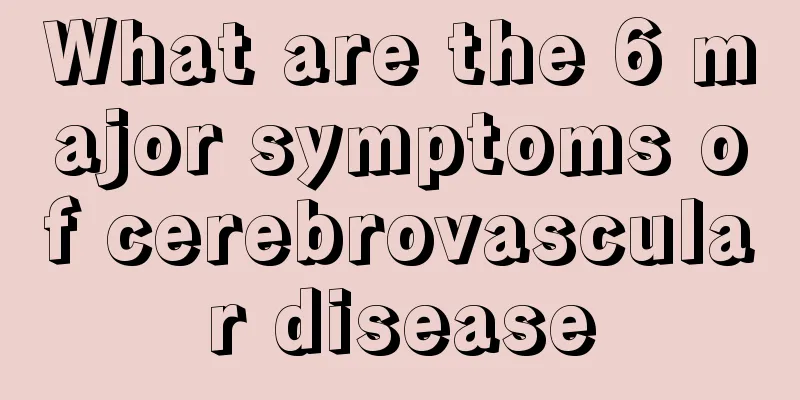What are the 6 major symptoms of cerebrovascular disease

|
Cerebrovascular disease is a relatively harmful disease, especially for the elderly, it may be directly fatal. In the early stages of cerebrovascular disease, there will be some more obvious symptoms, which should be enough to attract our attention, so that we can ensure early medical treatment and ensure that the disease is controlled in the shallow and early stages. Cerebrovascular disease refers to a group of diseases in which lesions occur in the cerebral arteries or the neck arteries that control the brain, causing obstruction of intracranial blood circulation and damage to brain tissue. The main symptoms of cerebrovascular disease are: (1) The disease starts suddenly, usually in one upper limb, and then the neurological dysfunction symptoms progressively affect other parts of the limb within a few hours or one or two days. (2) Headache Headache is a prominent symptom of subarachnoid hemorrhage. It is often a splitting pain in the entire head. For patients with cerebral hemorrhage, about 80% to 90% of them have severe headaches because the blood directly stimulates the meninges and the pain structures of the brain. The characteristic is that the pain is initially located on the affected side. When the intracranial pressure increases or blood flows into the subarachnoid space, a full headache may occur. Headaches caused by transient ischemic attack and cerebral infarction are mostly mild, but severe headaches may also occur when large-area cerebral infarction is combined with increased intracranial pressure. (3) Vomiting Vomiting is a common symptom of cerebrovascular disease, especially hemorrhagic cerebrovascular disease. For example, subarachnoid hemorrhage often presents as projectile vomiting, with an incidence rate of over 80%. When cerebral hemorrhage occurs, intracranial pressure increases, and vomiting and headaches become more severe. If the patient vomits coffee-colored stomach contents, it indicates upper gastrointestinal bleeding, which is a sign of serious illness. Vomiting is rare in patients with ischemic cerebrovascular disease, but it can also cause vomiting when there is a large area of cerebral infarction and increased intracranial pressure. (4) Impairment of consciousness is common in patients with cerebral hemorrhage and is the result of severe and extensive brain damage. It is reported that 60% to 80% of patients with cerebral hemorrhage may experience impaired consciousness. The clinical characteristics are that except for a small number of patients with mild cerebral hemorrhage who can remain conscious, the disturbance of consciousness in patients with brainstem hemorrhage and cerebellar hemorrhage is relatively serious. Patients with intraventricular hemorrhage may quickly go into a coma. The degree of consciousness disturbance after subarachnoid hemorrhage is relatively mild. Cerebral infarction rarely causes impaired consciousness, while large-area cerebral infarction is often accompanied by impaired consciousness. (5) Hemiplegia Hemiplegia refers to movement disorders of the upper and lower limbs and the tongue and facial muscles on one side. It is also a common symptom of cerebrovascular disease. Regardless of which side of the cerebral hemisphere is lesioned, it will cause hemiplegia on the opposite side of the lesion. The degree of hemiplegia can be mild or severe, ranging from incomplete paralysis to complete paralysis. Incomplete paralysis is also called mild paresis, and the patient can walk with the help of a cane. Complete paralysis is also called total paralysis, in which the patient is bedridden and unable to move on his own. Some patients may have more severe facial and tongue paralysis and less severe limb paralysis, or more severe upper limb paralysis and less severe lower limb paralysis, or more severe lower limb paralysis and less severe upper limb paralysis. The change from complete paralysis to incomplete hemiplegia indicates that the condition has improved. On the contrary, if incomplete paralysis develops into complete paralysis, it means that the condition is gradually worsening. (6) Aphasia is caused by damage to the speech center of the cerebral cortex of one hemisphere. Depending on the location of the damage and the clinical manifestations, it is divided into motor aphasia, sensory aphasia, mixed aphasia and nominal aphasia. Patients with motor aphasia have lost the ability to express themselves in language and cannot speak, but they can understand what others are saying and can answer questions with gestures or nodding. Patients with sensory aphasia cannot understand what others are saying, but because their language motor centers are intact, they can speak, and they speak quickly and fluently. However, when they talk to others, they answer questions irrelevantly. Patients with mixed aphasia have both motor aphasia and sensory aphasia. They cannot speak and cannot understand what others are saying. Anomia is a condition in which the patient can speak, understand what others say, and describe the properties and uses of objects, but cannot name the objects. |
<<: Can cooking wine be replaced by white wine? Correct understanding of cooking wine and white wine
>>: Symptoms and treatment of intrahepatic bile duct stones
Recommend
My hair is sticky after washing
Hair health is very important because the hair on...
Acne on chin 40 years old
The chin is the most prone area to acne. Because ...
How to treat eye stones? It turns out to be like this
Eye stones are multiple hard yellow spots that ap...
Is chest tumor serious?
The chest is a very important part of the female ...
What to eat to cleanse the intestines and promote bowel movements
The temperature of the weather is gradually risin...
What are the differences between black spots and moles?
Many people think that black spots and moles are ...
How to prepare mustard oil, its medicinal value cannot be ignored
Mustard is the powder of crushed mustard seeds. T...
Traditional Chinese medicine treatment for vomiting in patients with esophageal cancer
Vomiting is a common symptom in patients with eso...
Brief description: Several common symptoms of brain cancer
Brain cancer is a malignant tumor that poses a se...
How to tell if durian is ripe?
Because durian is wrapped in a hard shell, it tak...
Swimming reduces the risk of prostate cancer in men
Different types of exercise have different benefi...
Three nursing precautions for ovarian cancer patients undergoing intraperitoneal chemotherapy
Ovarian cancer is a tumor that is extremely harmf...
Can colorectal cancer be treated with chemotherapy during pregnancy?
Colorectal cancer is indeed a serious malignant t...
What are the hazards of Arabic hookah
Arabic hookah originated in present-day India and...
Build five lines of defense to prevent liver cancer
Do you know anything about liver cancer? Do you k...









